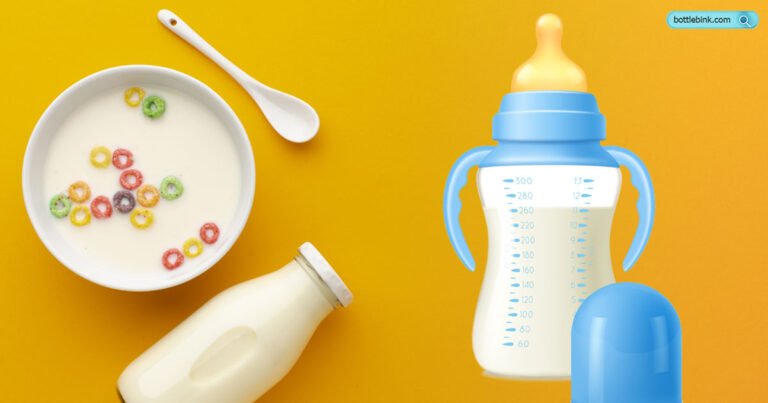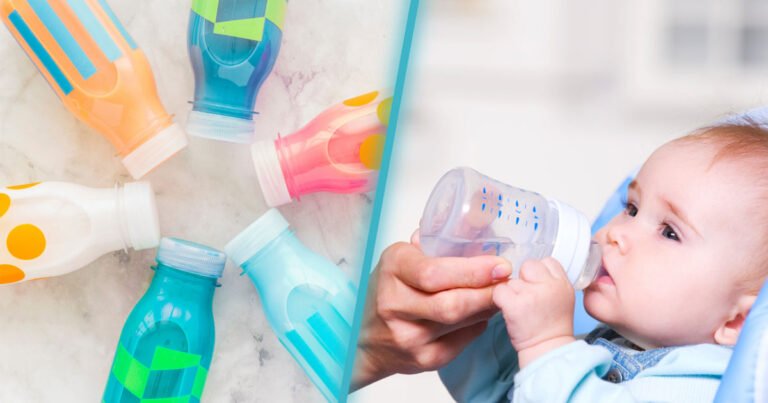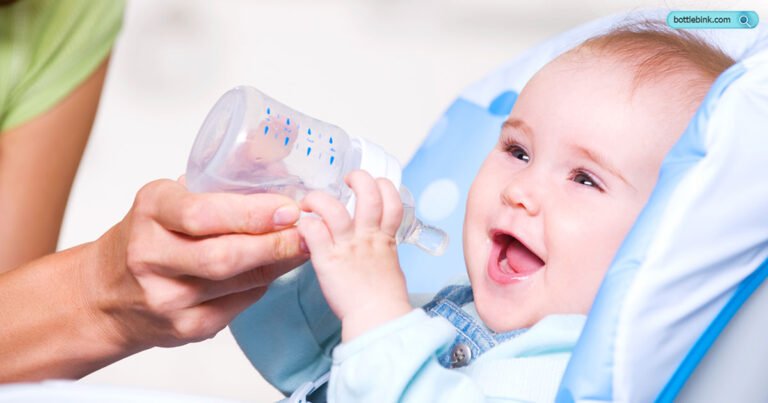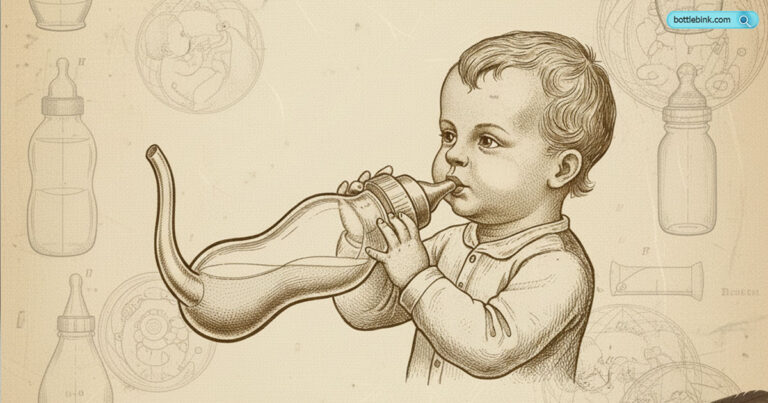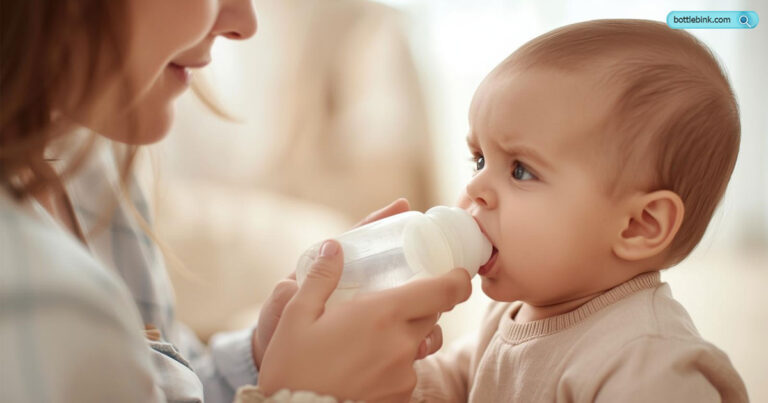Do I Need to Sterilize Baby Bottles Every Time? Essential Guide
Are you wondering if you really need to sterilize your baby bottles every single time? It’s a question many parents ask, especially when life gets busy and every minute counts.
You want to keep your baby safe and healthy, but you also don’t want to spend extra time on tasks that might not be necessary. Understanding when and how often to sterilize can save you stress and help you focus on what matters most—caring for your little one.
Keep reading to find clear answers and simple tips that make bottle care easier for you.

Why Sterilize Baby Bottles
Keeping baby bottles clean is very important for your baby’s health. Germs and bacteria can grow on bottles if not cleaned properly. Sterilizing kills these harmful germs and keeps bottles safe for feeding. This process helps protect your baby’s delicate immune system. It also gives parents peace of mind knowing bottles are free from harmful microbes.
Sterilization is more than just washing with soap and water. It uses heat or chemicals to destroy all bacteria and viruses. This step is especially important for newborns and babies under six months old. Their bodies are not strong enough to fight infections easily. Clean bottles help reduce risks of illness and discomfort.
Risks Of Germs And Bacteria
Bacteria can grow fast on baby bottles. Milk and formula leave tiny food particles behind. These particles feed germs and help them multiply. If bottles are not sterilized, babies can swallow harmful bacteria. This can cause stomach pain, diarrhea, or infections. Germs can also cause thrush, a common mouth infection in babies.
Benefits For Newborns
Newborns have very weak immune systems. They cannot fight germs like older children or adults. Sterilizing bottles protects newborns from dangerous bacteria. It lowers the chance of infections and illnesses. Clean bottles also help babies feed better without discomfort. Healthy feeding means better growth and development in the early months.
When Sterilization Is Crucial
Sterilization is very important in some situations. It is crucial for babies under three months old. Premature babies also need sterilized bottles to stay safe. If your baby is sick or has a weak immune system, sterilize bottles every time. Using sterilized bottles helps keep feeding safe and healthy.
Methods To Sterilize Bottles
Sterilizing baby bottles is important to keep your baby safe from germs. There are several easy ways to sterilize bottles at home. Each method kills bacteria and removes harmful germs effectively. Choose the method that fits your routine and tools available. Here are some popular and simple ways to sterilize baby bottles.
Boiling Water Technique
Boiling is a classic and reliable method to sterilize bottles. Fill a large pot with water and bring it to a rolling boil. Submerge all bottle parts completely in the water. Keep them boiling for at least 5 minutes. Remove carefully using clean tongs and place on a clean surface to dry. This method uses no chemicals and is very effective.
Electric Steam Sterilizers
Electric steam sterilizers use hot steam to kill germs quickly. Place bottles and parts inside the sterilizer. Add water as directed and turn it on. The device heats water and produces steam to sterilize bottles in about 6 to 15 minutes. It is fast, safe, and easy to use, making it popular for busy parents.
Microwave Sterilization
Microwave sterilization is a quick option using steam inside the microwave. Special microwave sterilizer bags or containers hold the bottles and water. Heat them in the microwave for a few minutes. Steam kills bacteria and dries bottles fast. This method saves time and does not need electricity or boiling pots.
Chemical Sterilizing Solutions
Chemical sterilizing uses liquid or tablet solutions to kill germs. Dissolve the tablet or liquid in cold water as per instructions. Soak bottles and parts fully for the recommended time, usually 30 minutes. Rinse bottles with boiled water before use. This method works well for travel or when no heat source is available.
Frequency Of Sterilization
Knowing how often to sterilize baby bottles helps keep your baby safe. It also saves time and effort. Babies’ immune systems are still growing. Germs can cause illnesses. Sterilizing removes these germs from bottles. The right frequency depends on the baby’s age and health.
Sterilizing After Each Use
Sterilizing bottles after every feeding is very safe. It removes all germs and bacteria. Newborns and premature babies need this care. Their immune systems are weak. Even a small germ can cause sickness. Use boiling water or a sterilizer for best results. This method ensures bottles stay clean and safe.
When Daily Sterilization Is Enough
Daily sterilization works well for healthy babies over one month old. Clean bottles with soap and water after each use. Then sterilize once a day. This method keeps bottles safe without extra effort. It balances safety and convenience. You can use steam sterilizers or boiling water. It saves time but still protects your baby.
Handling Bottles For Older Babies
Older babies have stronger immune systems. Washing bottles with hot soapy water is usually enough. Sterilizing less often is fine. Keep bottles dry and store them in a clean place. Avoid touching the inside of bottles with dirty hands. Proper cleaning helps prevent germs. Sterilize only if bottles have been dropped or exposed to dirt.

Credit: mommed.com
Cleaning Vs. Sterilizing
Cleaning and sterilizing baby bottles serve different purposes. Cleaning removes milk residue and dirt. Sterilizing kills bacteria and germs that cleaning might miss. Understanding the difference helps decide when each method is necessary.
Proper Bottle Cleaning Steps
Start by rinsing the bottle with warm water. Use a bottle brush and mild soap to scrub all parts. Pay attention to the nipple and cap. Rinse thoroughly to remove soap. Let the bottle air dry on a clean towel or rack.
When Cleaning Alone Suffices
Cleaning is enough for daily use. Especially if your baby is older than three months. When bottles are cleaned well, germs reduce significantly. Use sterilizing only if your baby has a weak immune system or is very young.
Combining Cleaning And Sterilizing
Sterilize bottles after cleaning to ensure full safety. Use boiling water, steam sterilizers, or sterilizing solutions. This is important during the first months. Also, sterilize if bottles fall on the floor or get dirty outside.
Storage Tips For Sterilized Bottles
Storing sterilized baby bottles correctly keeps them clean and safe for your baby. Proper storage stops germs from getting inside. It also keeps bottles ready for feeding without extra work. Follow simple steps to protect sterilized bottles and keep your baby healthy.
Keeping Bottles Germ-free
Always wash your hands before handling sterilized bottles. Use clean, dry hands to avoid germs. Store bottles in a clean container with a lid. Avoid open areas where dust or insects can reach them. Do not touch the inside of the bottle or nipple after sterilizing.
Safe Bottle Storage Practices
Place bottles upright to prevent moisture build-up inside. Keep bottles in a cool, dry place away from sunlight. Avoid storing near strong-smelling items, as bottles can absorb odors. Use a dedicated storage box or cupboard for bottles only. Label the storage area to remind others about cleanliness.
Using Sterilized Bottles Later
Use sterilized bottles within 24 hours for best safety. If not used within this time, re-sterilize before feeding. Always check the bottle and nipple for dust or dirt before use. Warm the bottle safely, avoiding microwaves that cause hot spots. Feeding with clean, sterilized bottles keeps your baby safe and healthy.
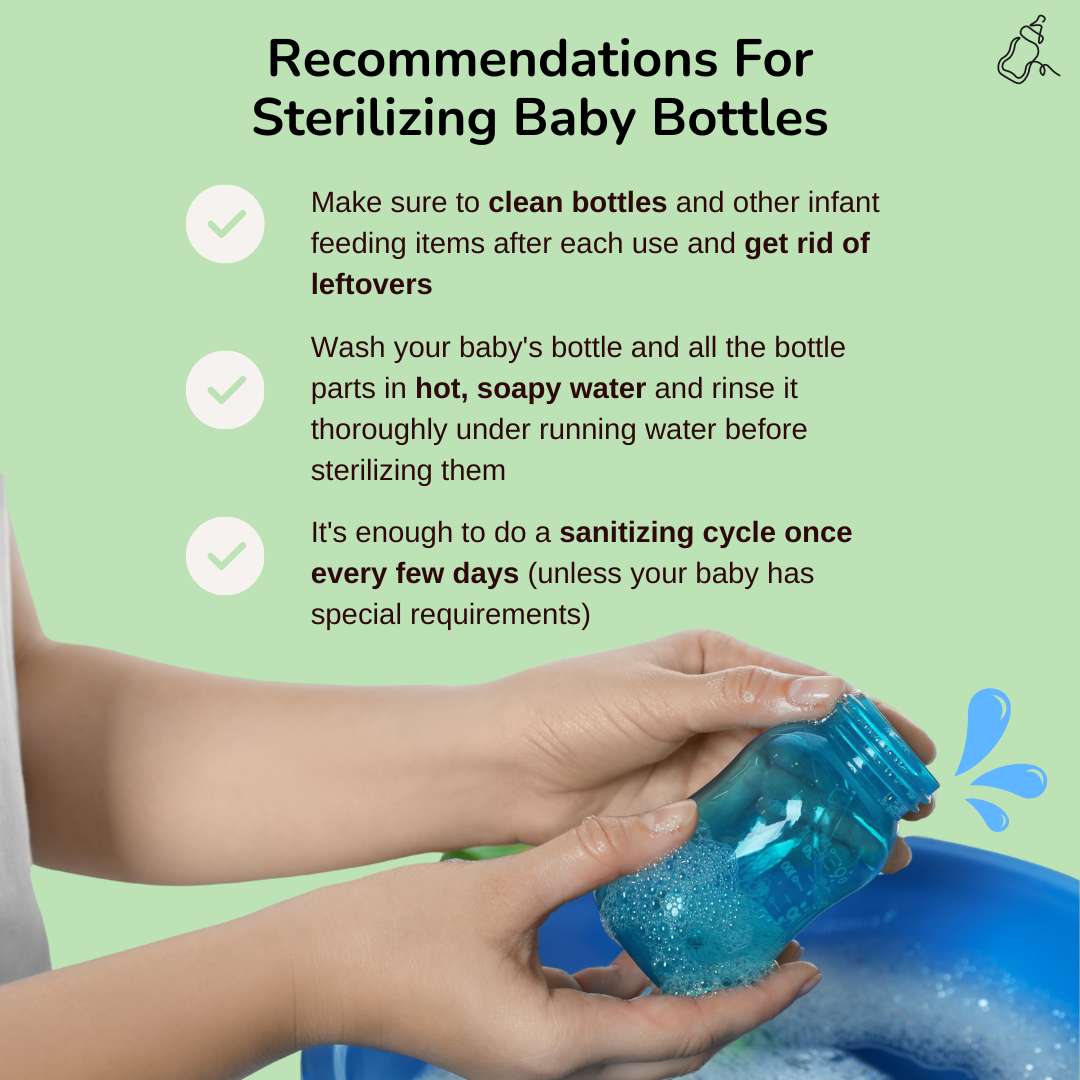
Credit: babymilkbar.com
Common Sterilization Mistakes
Sterilizing baby bottles is important for your baby’s health. Many parents make common mistakes that reduce sterilization effectiveness. These errors can let bacteria grow, risking your baby’s safety.
Knowing these mistakes helps keep bottles clean and safe. It protects your child from infections and stomach problems. Pay attention to the details when sterilizing.
Skipping Sterilization Too Soon
Newborns need sterilized bottles for at least the first year. Some parents stop sterilizing too early. This exposes babies to harmful germs. Always follow your pediatrician’s advice on when to stop.
Even if bottles look clean, invisible bacteria may be present. Sterilize regularly until your baby’s immune system is strong.
Improper Sterilizing Techniques
Boiling bottles less than five minutes won’t kill all germs. Using cold water or not covering bottles can cause contamination. Sterilize bottles with the right method and time.
Microwave sterilizers need enough water and proper timing. Electric sterilizers must be cleaned often. Follow instructions carefully for best results.
Ignoring Bottle Parts And Accessories
Bottle nipples, rings, and caps can hold bacteria too. Many parents clean only the main bottle part. This allows germs to hide in small areas.
Disassemble all parts before sterilizing. Clean each piece thoroughly. Don’t forget bottle brushes and pacifiers in the process.
FAQs About Do I Need to Sterilize Baby Bottles Every Time
How Often Should Baby Bottles Be Sterilized?
Sterilize bottles before first use and regularly during the first year for safety.
Is Boiling Water Enough To Sterilize Baby Bottles?
Boiling water for 5 minutes effectively kills most germs on bottles.
Can I Use A Dishwasher To Sterilize Bottles?
Dishwashers with a high-heat setting can sterilize bottles, but check manufacturer advice.
When Can I Stop Sterilizing Baby Bottles?
Stop sterilizing when your baby is over 12 months and eating solid foods.
What Are Common Methods To Sterilize Baby Bottles?
Boiling, steam sterilizers, microwave bags, and chemical sterilizers are common methods.
Does Sterilizing Kill All Bacteria On Baby Bottles?
Sterilizing kills most harmful bacteria but does not remove dirt; clean bottles first.
Can Sterilizing Bottles Prevent All Baby Infections?
Sterilizing reduces infection risk but good hygiene and cleaning are also important.
Is Sterilizing Necessary For Expressed Breast Milk Bottles?
Sterilizing is recommended to keep expressed milk bottles safe and free from germs.
Conclusion
Sterilizing baby bottles keeps your baby safe from germs. Not every feeding needs sterilizing. Clean bottles well with soap and water first. Sterilize bottles daily for newborns or sick babies. Older babies with stronger immune systems may need less. Always follow your doctor’s advice for your baby’s health.
Cleanliness helps prevent infections and keeps bottles safe. Trust your routine and stay consistent with cleaning. Your baby’s health is the top priority, always. Simple steps make feeding time safer and easier.

